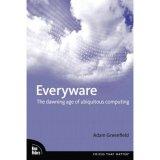Difference between revisions of "The Future of Ubiquitous computing in 2025"
| Line 17: | Line 17: | ||
== The Driving Forces == | == The Driving Forces == | ||
[[Image:Drivingforces-s.jpg|thumb|right| Wiki's Driving Forces Page]] | |||
=== Economical === | === Economical === | ||
*[[Entrepreneurship]] | *[[Entrepreneurship]] | ||
| Line 22: | Line 25: | ||
*[[Increasing Information transparency]] | *[[Increasing Information transparency]] | ||
*[[Economies of scale]] | *[[Economies of scale]] | ||
=== Environmental === | === Environmental === | ||
Revision as of 03:32, 6 March 2007
Team Composition
Introduction
Ubiquitous computing (ubicomp) integrates computation into the environment, rather than having computers which are distinct objects. Other terms for ubiquitous computing include pervasive computing, calm technology, things that think, everyware, and more recently, pervasive Internet. Promoters of this idea hope that embedding computation into the environment and everyday objects would enable people to interact with information-processing devices more naturally and casually than they currently do, and in ways that suit whatever location or context they find themselves in.
Ubicomp's central aim has been invisibility, meaning that one does not need to continually rationalize one's use of a ubicomp system. Having learnt about its use sufficiently well, one ceases to be aware of it. It is "literally visible, effectively invisible" in the same way that a skilled carpenter engaged in his work might use a hammer without consciously planning each swing. Similarly, when you look at a street sign, you absorb its information without consciously performing the act of reading.
Ubicomputing is considered by some as the next great wave in IT development.
The Driving Forces
Economical
Environmental
Political
- Increased demand in security & surveillance
- Increased military investment
- Push for a knowledge society
- Governmental support for technology development
- South Korea
- Japan
Social
- Aging population
- Increasing access & quality of healthcare
- Increasing demand for easier life
- Increasing safety concerns
- Interlinking society
- Increasing use of computer-mediated communication
- Increasing demand & usage of home electronic appliances
Technological
- Electronic Labeling
- Human Computer Interaction
- Universal Broadband Network Access
- Distribution of Processing Power
- Storage Capacity
- Development of Standards
System Diagram
Scenarios
Research
Research Agenda
Analysis of the book 'Everyware' on Ubiquitous Computing
Experts
- Marc Weiser
- Adam Greenfield
- Akihisa Fujinuma
- Teruyasu Murakami
- Ichire Morimoto
- Hiroyuki Makamura
- Friedemann Mattern
- Takeshi Nakagawa
- Hideaki Nakamoto
- Masatoshi Komeichi
- Tadashi Tsuji
- Toshitada Nagumo
- Hisao Nakajima
- Yasutake Okano
Related Articles
- The Disappearing Computer by Bill Gates. link
- A Digital Life link
- Original website of Marc Weiser. link
- Techware. link
- Wearable computing Lab ET Zurich. link
- Social, Economic, and Ethical Implications of Ambient Intelligence and Ubiquitous Computing. Link
- Wireless Future: Ubiquitous Computing Link
- Living in a World of Smart Everyday Objects - Social, Economic, and Ethical Implications Link
- Ambient Intelligence: Changing Forms of Human-Computer Interaction and their Social Implications Link
- What Does Ubiquitous Computing Mean For Teaching and Learning? Link
- EU Report: Shaping Europe’s Future Through ICT Link
- Toward Computer-Supported Ubiquitous Language-Learning Link
- Supporting Classroom Activities toward the Ubiquitous Learning Environment Link
Videos
- Amigo: The Intelligent Home Network link
- CES 2007 - Microsoft Keynotelink
- HCI with eye-motion detection link
- Intelligent Drawings (for kids) link
- Multi-Touch Experience link
- Minority Report becomes reality link
- Ubicomputing Fashion South Korea link
- Wearable Computing Systems link
Books
 The dawning age of Ubiquitous Computing by Adam Greenfield
The dawning age of Ubiquitous Computing by Adam Greenfield
Rating & Comments
<pagerating from="Poor" to="Good" category="Scenario"> Rate this page</pagerating>
